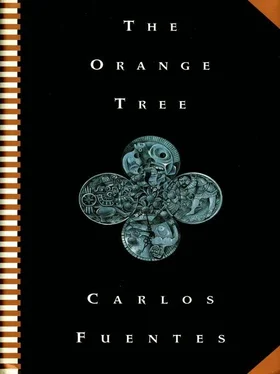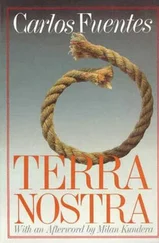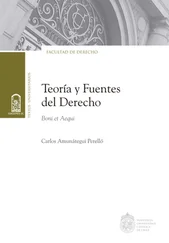No captain from the Indies ever returned in such glory, all paid for out of his own pocket and not the King’s. From the port of Palos, where he landed, my father made his way to the court, at that moment in Toledo, with a retinue of eighty people brought from Mexico, Besides the Spaniards who accepted the open invitation to join the troop of soldiers of the conquest, there were Indian nobles, circus players, dwarfs, albinos, and many servants as well as hummingbirds, parrots, quetzals, buzzards, turkeys, desert plants, wildcats, jewels, and illustrated codices, which it took my father two ships to bring to Spain. He then hired mules and wagons to travel north from Andalusia to Castile, passing through his hometown of Medellín, where he knelt at the tomb of his father, my grandfather, in whose honor I was named. He kissed the hand of Catalina Pizarro, his widowed mother: mother to one conquistador and aunt of another, Don Francisco Pizarro, also from Estremadura.
The difference between them was that my father knew how to read, while Pizarro didn’t. Cortés and Pizarro met this time on the road, when one was already everything while the other was still no one — although in the end bad luck makes all of us equal. Everyone noticed the insane glint in the eye of the other Estremeño as he watched my father scattering gifts to get favors, giving ladies tiaras with green feathers, all covered with silver filigree, gold, and pearls, ordering a supply of liquid amber and balsam so the women he met in courts and royal towns could perfume themselves. In that style, he made his way to the court in Toledo, amid banquets and parties, preceded by a fame and display that impressed everyone. When he reached the court, he entered Mass late and walked in front of the most illustrious gentlemen in Spain to sit down next to the King Don Carlos, amid whispers of envy and disapproval.
Nothing stopped my father! He squandered everything except five extremely fine emeralds he got from Moctezuma and which he always carefully kept for himself, as proof, in my opinion, of the great deeds he’d accomplished. One emerald was carved into a rose, another into a trumpet, the third into a fish with golden eyes, while the fourth was like a little bell with a rich pearl for a clapper and all edged in gold, with the inscription “Blessed is he who raised you.” The fifth emerald was a little cup resting on a gold base and attached to four little chains that are fastened to a pearl the size of a button.
My father always bragged about those emeralds, so much so that when the Queen found out about them, she demanded to see them and then wanted to keep them, saying that the Emperor, Don Carlos, would pay one hundred thousand ducats for them. Bur my father prized them so highly he denied them even to the Empress, using the excuse that he’d promised them to my mother, Juana de Zúñiga, to whom he’d recently been married … And that’s how it was: he brought her back to Mexico, and if he set out from Cuba to conquer Mexico in ostentatious display and if he returned from the conquest of Mexico to Spain in ostentatious display, now he once again returned to the vanquished land in maximum luxury. Until his enemies, the usual jealous suspects, stopped him at Texcoco outside Mexico City, besieging him in hunger while the suit initiated against him in his absence was resolved. They denied my father bread. They denied bread to my grandmother, Doña Catalina Pizarro, whom my father brought to Mexico so she might see what her son had won for Spain and the King. My grandmother, Doña Catalina, newly widowed, was seduced by her son’s words: “Leave Medellín, where you’ve been a tough, religious, but impoverished woman and come to Mexico to be a great lady.” Well, gentlemen, my grandmother died of hunger in Texcoco, of hunger, Catalina Pizarro, my grandmother, died of hunger … Of hunger, believe it or not, of hunger! Why in this family is there no pause between happiness and disaster, between triumph and defeat? Why?
MARTÍN 2
My brother speaks of riches, jewels, servants, finery, titles, powers, and lands, but also of hunger … I talk about papers. Each thing you’ve mentioned, Martín my brother, surrendered its hardness and turned into paper, mountains of paper, labyrinths of paper, paper vomited out by lawsuits and eternal trials, as if each thing conquered by our father had one single postponed destiny: the accumulation of briefs in the courts of the two Spains, the old and the new. Victim of an eternally deferred trial in which material things ended up showing they carried within their souls a paper double, flammable and drownable. Things erased by the fire and water of erased paper.
Take a look, Brother: the lawsuit of Hernán Cortés against some parties named Matienzo and Delgadillo over the lands and gardens between the Chapultepec and Tacuba causeways. Another lawsuit, one month later, against the same parties over a dispute about tributes and services from Indians in Huejotzingo. Letters listing grievances against the Crown. Lists of eighty, a hundred, a thousand repetitive questions. Expenditures for scribes, scriveners, messengers. More than two hundred royal documents relevant to our father, denying his grievances, putting off his claims, paying him in chilly gall for the blazing gold of the conquest. A world of shyster lawyers, of laws obeyed but never carried out, of ink-stained hands, pyramids of legal briefs, quills plucked to write a thousand legacies — more feathers in the inkwells than geese in the ponds! The unending residency trial against your father and mine in Mexico over everything already mentioned: corruption, abuse, carnal promiscuity, rebellion, and murder.
And as you well know, the trial involving our father was never resolved. It was consigned to two thousand folios and sent from Mexico to the Council of the Indies in Seville. Thousands of pages, hundreds of documents. The ink itself grows impatient. The pen scratches. The mountain of parchments is interred in the archives, the dead destiny of history. Don’t fool yourself, tell the truth with me, Brother Martín: two thousand folios of legal prose were buried forever in Seville because the point was to keep the case unresolved, like a sword of Damocles over the heads of my father and his children. You are moved, my imbecilic brother, by the fatal hand of fame and paternal luxury, but you lack the cunning that always accompanied the fates of my father, his glory and his ruin. Was he great in both? I still don’t know. The true history, not the dusty archives, will tell it all one day. The living history of memory and desire, Brother, which always takes place right now, not yesterday, not tomorrow. But what better example can I give than I myself, letting myself be dragged into your mad adventure by you, whom I know so well even though I don’t know whether to scorn or fear you. A shame, Brother. Why did it occur to me to confide in you?
MARTÍN 1
I’m not as stupid as you think, Martín the Second. Second, second-rate, although that grieves you. I wound you to wound myself and to show that I too know how to see what’s happening quite clearly. Don’t think I’m blind when it comes to destiny, an Oedipus from the Indies. I love and respect our father. He died in my arms, not in yours. I understand what you’re saying. Hernán Cortés had two destinies. How could he not flee from that eternal lawsuit, from that sedentary courtroom, to throw himself into one insane adventure after another? The same way he left behind the Estremadura of his boyhood to discover the New World for himself, the same way he abandoned Cuba and its placid life to set about the conquest of Mexico. He did the same thing leaving behind the world of intrigues and paper wars that followed the conquest to rush off to Honduras first and then to the exploration of the most sterile territory in the world, that long coast on the Southern Sea, where he did not find, as perhaps he dreamed he would, either the kingdom of the Seven Cities of Gold or the loves of the Amazon queen Calafia, All he found were sand and sea. How could he not feel himself humiliated when on his return from the Californias he found that the sinister and cruel Nuño de Guzmán would not allow him to pass through the lands of Xalisco?
Читать дальше












